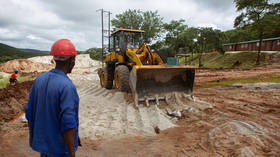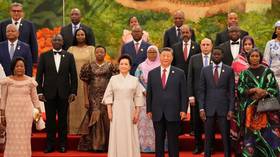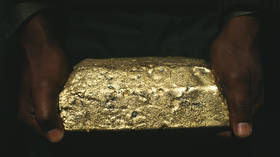Africa has something China and the West need, but will it profit?

The competition for Africa’s strategic minerals is intensifying, with fierce battles for resources unfolding between Western and Chinese investors. As Africa’s mining market develops, the continent must strive to avoid past mistakes and establish effective regulatory frameworks to govern the industry.
Africa’s established role as a leading producer and exporter of copper, cobalt, nickel, platinum, uranium, graphite, and several other minerals is well known. However, major developments in the mining industry in several African countries – Zimbabwe, Mali, Ghana, and the Democratic Republic of the Congo – are turning the region into a key producer of another vital mineral – lithium.
The role of lithium
Lithium is strategically vital for the global battery and semiconductor industries. Most people are familiar with lithium-ion batteries; in fact, every industry that relies on energy storage technologies requires lithium batteries, but much more powerful ones. Electric vehicle manufacturers, the producers of chargers for electronic devices, and manufacturers of solar and wind power plants all use lithium batteries.
In recent years, interest in lithium extraction in Africa has surged. Western investors are pouring capital into the sector, which attracts major players such as the Rio Tinto mining corporation, which is engaged in lithium exploration in Rwanda. Chinese companies have also increased their presence in Africa. Since the 2020s, China has transitioned from being a buyer of lithium to acquiring assets and investing in lithium exploration in Zimbabwe and Mali.
The growing interest in Africa’s lithium reserves was triggered by a spike in global lithium prices in 2021-2022. Lithium carbonate (Li2CO3) prices surged to $70,000 per ton in November 2022. Currently, demand for lithium from electric vehicle manufacturers has stabilized and prices have dropped (to approximately $10,000 per ton), but the market continues to develop dynamically, ensuring sustained long-term demand.
Lithium in Africa
Africa accounts for 6% of the world’s identified lithium resources (about 5 million tons). The Democratic Republic of the Congo (DRC) is the leading source of identified lithium reserves (3 million tons) on the continent. Lithium has also been found in Mali, Zimbabwe, Namibia, and Ghana, and exploration continues in Angola, Botswana, Guinea, Zambia, Cameroon, Côte d’Ivoire, Liberia, Madagascar, Rwanda, Tanzania, and South Africa. Reports indicate minor lithium deposits in Burkina Faso, Mozambique, Nigeria, Uganda, and Ethiopia, and there are ongoing preparations for exploration in Liberia and Niger. Notably, much of Africa remains uncharted in terms of lithium potential, suggesting the continent’s share of global reserves may be higher than the current estimate.
Currently, Zimbabwe accounts for most of Africa’s lithium mining. In recent years, Chinese investors have poured around $2 billion into lithium exploration and infrastructure development (consequently, Zimbabwe’s lithium production tripled in 2023, reaching 3,500 tons). The lithium sector is also rapidly evolving in several West African nations, particularly in Mali, where mining started this year, and in Ghana, where it could start next year. Overall, it is one of the fastest-growing segments of Africa’s mining industry.
China vs the West
Just like in other industries, the competition between Western and Eastern investors is tough. Currently, Chinese businesses have gained control over some of the most promising assets in Zimbabwe, monopolizing the lithium sector there and in Mali. The Ewoyaa Lithium Project in Ghana is currently the only project focused on supplying lithium to Western countries.
Western nations are likely to coordinate their efforts to bolster their positions in the lithium market. For this purpose, the Minerals Security Partnership (MSP) was established in June 2022, bringing together Australia, Canada, Finland, France, Germany, Japan, South Korea, Sweden, the UK, the US, and the European Commission.
However, given that logistics and the ability to export lithium concentrate remain critical factors for the economic viability of lithium extraction – especially considering the lack of processing facilities in Africa – in the medium term, China will remain the primary processing hub for lithium mined in Africa.
Will Africa profit from it?
The competition for Africa’s ‘critical minerals’ is intensifying each year, and the battle between Western and Chinese investors is becoming increasingly fierce. As the markets are developing, African nations are establishing regulatory frameworks to govern these sectors, and the roster of foreign investors changes annually. At this stage, it’s crucial for African countries to avoid the mistakes they have made in the oil and gas industry. The experience from that sector shows that the window of opportunity for shaping an industry is quite narrow, and once established, rules and regulations become rigid and resistant to change. Consequently, the oil and gas industries in Algeria, Egypt, and Nigeria still operate under guidelines established at the end of the colonial era.
African nations are already taking steps to develop their own mineral processing industries. Countries such as Tanzania, Zimbabwe, and Namibia are implementing bans on raw ore exports, requiring at least partial beneficiation on their own territory. Such requirements ensure the development of a dynamic mining sector, diversify the economy, and attract technology, foreign investment, and expertise.
Unfortunately, due to various factors – and particularly energy shortages – it remains difficult to completely localize value chains in Africa. On the other hand, the unprecedented growth of the critical minerals market presents a significant opportunity for African nations, which they can leverage to develop infrastructure and facilitate the transfer of knowledge and technologies. The success of this strategy will largely depend on the regulatory frameworks that are currently being developed by the governments of African countries, and which will require the retraining of civil servants and the development of long-term industry strategies.















